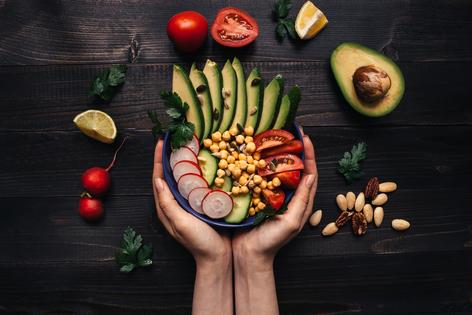What parents need to know about a vegan diet
Published in Health & Fitness
A vegan diet is made up of only plant-based products — no meat, fish, dairy or eggs (some people also exclude honey). While these diets are still relatively rare, they are becoming more common. Some families or teens choose them for health reasons, and it’s certainly true that plant-based diets are low in saturated fat and can have other health benefits. Some choose them for philosophical reasons — either sustainability, or not wanting to harm animals, or both.
Whatever the reason, it’s important to get educated before you begin. You should talk to your doctor, and if possible it’s a good idea to also meet with a nutritionist. Because while vegan diets can absolutely be healthy, there are some nutritional and other issues that can cause trouble if you aren’t careful.
Calories and protein for children eating a vegan diet
Two issues you should learn about and plan for are:
Calories. Plant-based foods tend to have fewer calories than animal-based ones. This is not a bad thing, given the current obesity epidemic in the U.S., but it’s important to be sure that children and teens get enough calories to grow and support daily activity. The number of calories a child needs will depend on their age, size and activity level. Nuts, nut butters, and soy products can help add calories, as can granola and other whole-grain products.
Protein. Protein is crucial, not just for building muscle but for all sorts of body processes. This is another nutrient that is simply easier to get from animal products, as there is more of it and it is complete, meaning that it has all the amino acid building blocks that humans need. The protein you get from plant products is less accessible to the body and may or may not be complete — and for that reason, people on vegan diets need to eat more protein than those on animal-based diets, to be on the safe side. As with calories, the amount of protein a child needs depends on their age and size. Nuts, legumes (including peanuts), soy products and whole grains are good sources of protein.
Key minerals and vitamins for children eating a vegan diet
Consider sources for key minerals and vitamins:
Calcium. Calcium is important, especially for bone health. Dairy is the easiest source of calcium, but there are other ways to get it, including foods like kale, bok choy and broccoli. Many “alterna-milks” such as soy milk and almond milk are fortified with calcium (and vitamin D), as are some brands of orange juice.
Iron. Iron is important to keep our blood and our bodies healthy and strong. Fortified cereals and some other plant products have iron, but it’s not a bad idea to give your child a multivitamin with iron.
...continued







Comments